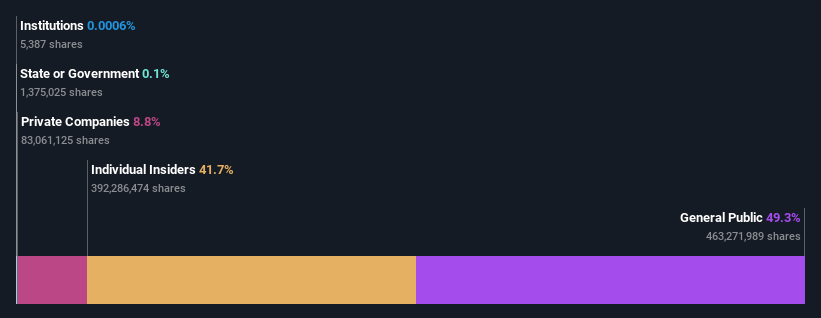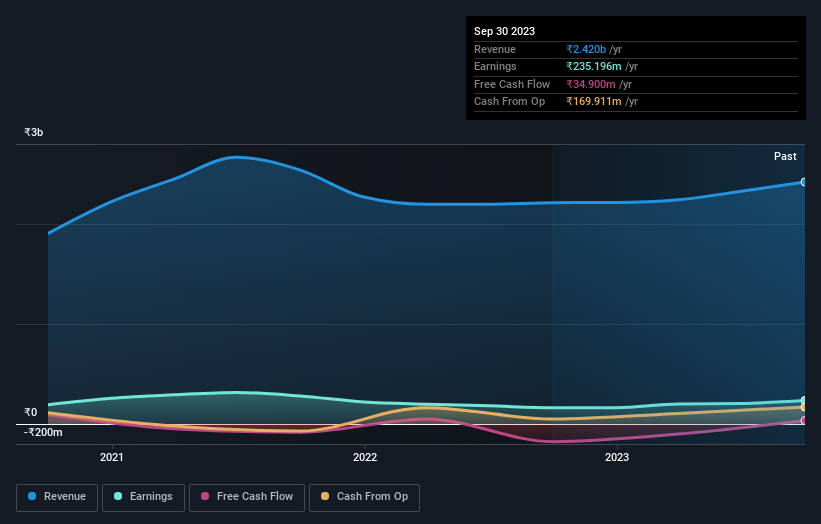Individual investors invested in Syncom Formulations (India) Limited (NSE:SYNCOMF) up 11% last week, insiders too were rewarded
Key Insights
- Syncom Formulations (India)'s significant individual investors ownership suggests that the key decisions are influenced by shareholders from the larger public
- The top 6 shareholders own 51% of the company
- 42% of Syncom Formulations (India) is held by insiders
To get a sense of who is truly in control of Syncom Formulations (India) Limited (NSE:SYNCOMF), it is important to understand the ownership structure of the business. The group holding the most number of shares in the company, around 49% to be precise, is individual investors. Put another way, the group faces the maximum upside potential (or downside risk).
Individual investors gained the most after market cap touched ₹16b last week, while insiders who own 42% also benefitted.
Let's take a closer look to see what the different types of shareholders can tell us about Syncom Formulations (India).
See our latest analysis for Syncom Formulations (India)

What Does The Lack Of Institutional Ownership Tell Us About Syncom Formulations (India)?
Institutional investors often avoid companies that are too small, too illiquid or too risky for their tastes. But it's unusual to see larger companies without any institutional investors.
There could be various reasons why no institutions own shares in a company. Typically, small, newly listed companies don't attract much attention from fund managers, because it would not be possible for large fund managers to build a meaningful position in the company. It is also possible that fund managers don't own the stock because they aren't convinced it will perform well. Syncom Formulations (India) might not have the sort of past performance institutions are looking for, or perhaps they simply have not studied the business closely.

Syncom Formulations (India) is not owned by hedge funds. Because actions speak louder than words, we consider it a good sign when insiders own a significant stake in a company. In Syncom Formulations (India)'s case, its Top Key Executive, Kedarmal Bankda, is the largest shareholder, holding 24% of shares outstanding. For context, the second largest shareholder holds about 12% of the shares outstanding, followed by an ownership of 5.0% by the third-largest shareholder. Interestingly, the second-largest shareholder, Vijay Bankda is also Chief Executive Officer, again, pointing towards strong insider ownership amongst the company's top shareholders.
We did some more digging and found that 6 of the top shareholders account for roughly 51% of the register, implying that along with larger shareholders, there are a few smaller shareholders, thereby balancing out each others interests somewhat.
While studying institutional ownership for a company can add value to your research, it is also a good practice to research analyst recommendations to get a deeper understand of a stock's expected performance. We're not picking up on any analyst coverage of the stock at the moment, so the company is unlikely to be widely held.
Insider Ownership Of Syncom Formulations (India)
The definition of company insiders can be subjective and does vary between jurisdictions. Our data reflects individual insiders, capturing board members at the very least. The company management answer to the board and the latter should represent the interests of shareholders. Notably, sometimes top-level managers are on the board themselves.
Most consider insider ownership a positive because it can indicate the board is well aligned with other shareholders. However, on some occasions too much power is concentrated within this group.
Our information suggests that insiders maintain a significant holding in Syncom Formulations (India) Limited. Insiders have a ₹6.6b stake in this ₹16b business. This may suggest that the founders still own a lot of shares. You can click here to see if they have been buying or selling.
General Public Ownership
The general public, who are usually individual investors, hold a 49% stake in Syncom Formulations (India). While this group can't necessarily call the shots, it can certainly have a real influence on how the company is run.
Private Company Ownership
We can see that Private Companies own 8.8%, of the shares on issue. It's hard to draw any conclusions from this fact alone, so its worth looking into who owns those private companies. Sometimes insiders or other related parties have an interest in shares in a public company through a separate private company.
Next Steps:
It's always worth thinking about the different groups who own shares in a company. But to understand Syncom Formulations (India) better, we need to consider many other factors. Take risks for example - Syncom Formulations (India) has 1 warning sign we think you should be aware of.
If you would prefer check out another company -- one with potentially superior financials -- then do not miss this free list of interesting companies, backed by strong financial data.
NB: Figures in this article are calculated using data from the last twelve months, which refer to the 12-month period ending on the last date of the month the financial statement is dated. This may not be consistent with full year annual report figures.
New: Manage All Your Stock Portfolios in One Place
We've created the ultimate portfolio companion for stock investors, and it's free.
• Connect an unlimited number of Portfolios and see your total in one currency
• Be alerted to new Warning Signs or Risks via email or mobile
• Track the Fair Value of your stocks
Have feedback on this article? Concerned about the content? Get in touch with us directly. Alternatively, email editorial-team (at) simplywallst.com.
This article by Simply Wall St is general in nature. We provide commentary based on historical data and analyst forecasts only using an unbiased methodology and our articles are not intended to be financial advice. It does not constitute a recommendation to buy or sell any stock, and does not take account of your objectives, or your financial situation. We aim to bring you long-term focused analysis driven by fundamental data. Note that our analysis may not factor in the latest price-sensitive company announcements or qualitative material. Simply Wall St has no position in any stocks mentioned.
About NSEI:SYNCOMF
Syncom Formulations (India)
Manufactures, markets, and sells pharmaceutical formulation products in India and internationally.
Flawless balance sheet with solid track record.
Market Insights
Community Narratives



